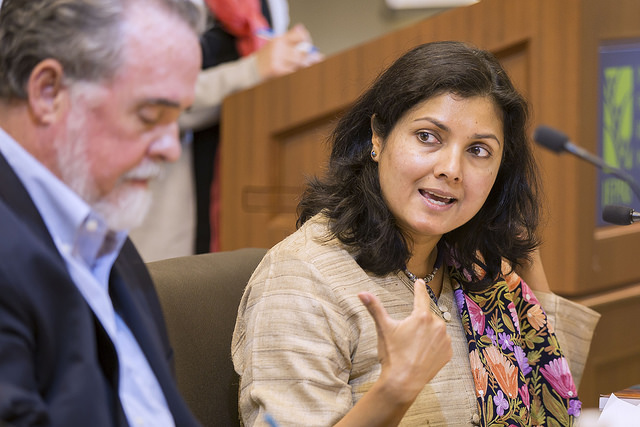Is politics an obstacle or a means to achieving the U.N. Sustainable Development Goals? At a recent IFPRI event, “Making Politics Work to Meet the SDGs,” Senior World Bank Economist Stuti Khemani argued that politics may be flawed, but paying attention to political incentives is the only way to achieve results. “The selection and sanctioning of leaders is key to both understanding government failure and solving it,” she said. “When politics is the problem, you cannot bypass it; rather solutions have to be found by going through it.”
Khemani presented the main messages of a new World Bank policy research report, Making Politics Work for Development: Harnessing Transparency and Citizen Engagement. Focusing on two forces—political engagement and transparency—Khemani outlined the challenges: There are many political incentives to ignore data and other hard evidence, and perverse behavioral norms are prevalent among political and bureaucratic leaders and citizens alike. But political engagement is also the fundamental driver of governance and development, Khemani said.
The power of transparency to achieve the SDGs largely depends on what individuals do with it, she added, and the hope is that it leads to citizen engagement to solve collective action problems for the greater public good.
Oxfam America President and CEO Raymond C. Offenheiser argued that a major force underlying poverty is social and political exclusion, and said that fighting for basic rights can help achieve the SDGs. Those include social, political, and civil rights, as well as economic rights to food, housing, employment, and decent livelihoods. Offenheiser concluded that civil society must push both the state and the market to provide morally suitable outcomes in the delivery of public goods and services.
Khemani and Offenheiser both stressed that those working to achieve the SDGs cannot simply accept political impediments and settle for second-best solutions. Instead, they must engage individuals in participatory ways and relax political constraints in order to achieve first-best solutions.
Both speakers also touched on the issue of data. Khemani said it is not enough for citizens to have information about policy actions; they also need information about policy consequences. Offenheiser said policymakers must consider whether there is too much or too little data, which types of data to produce, and the role of that data, its end-users, and rights to access it.
Tewodaj Mogues, a Senior Research Fellow at IFPRI, said it would be interesting to contrast outcomes through better transparency with outcomes through alternative endeavors that can also operate through citizen engagement—for example, efforts to improve capacity for collective action of the poor in both the economic and political arenas.
It is hard to generalize about what form of citizen engagement is most effective, Mogues said. While some suggest great promise lies in local political activism, political space is often more closed at the local government level than at the national level, so it is critical not to confuse decentralization with improved political representation. Those seeking the optimal level (national or local) to catalyze citizen engagement should consider each situation on a case-by-case basis, she said. Despite Khemani’s caveat that the report’s evidence takes political institutions as a given, Mogues noted that it offers many strong and instructive case studies of countries where institutional political change improved citizen engagement and public service delivery.
IFPRI Senior Research Fellow Katrina Kosec wondered whether there might be substantial benefits—similar to those from citizen outreach efforts— in providing better information to government actors, including service providers. She also noted the potential of non-political citizen engagement‑such as people providing basic services in communities when the government fails to do so‑and urged the development community not to be pessimistic about such efforts.
This type of engagement, she said, can provide valuable information to governments on what citizens want, and may actually pressure officials to act. For example, citizen report cards for frontline service providers—a method for citizens to provide feedback on what is working and what is not in service delivery—convey useful information to higher levels of government. That might actually prompt officials to design better incentive schemes for frontline providers. Kosec went on to pose a question for the development community: How do we achieve good transparency in the first place, in environments that do not yet have healthy political engagement? Are there roles for external actors, or technology, to help?
Expanding on some of the themes and policy lessons of the World Bank Report, IFPRI will host a workshop on “Harnessing Information for Accountable Rural Service Delivery” in April 2017. Interested parties are invited to contact the organizer of this workshop, Katrina Kosec at k.kosec@cgiar.org for more information on the call for papers and the workshop itself.
Katarlah Taylor is an Information and Knowledge Management Facilitator at IFPRI.







